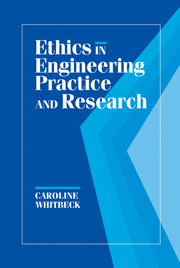Book contents
- Frontmatter
- Contents
- Preface
- Foreword
- INTRODUCTION TO ETHICAL CONCEPTS
- 1 ETHICS AS DESIGN: DOING JUSTICE TO ETHICAL PROBLEMS
- 2 THE BASIS AND SCOPE OF PROFESSIONAL RESPONSIBILITY
- 3 CENTRAL PROFESSIONAL RESPONSIBILITIES OF ENGINEERS
- 4 TWO MODELS OF PROFESSIONAL BEHAVIOR: ROGER BOISJOLY AND THE CHALLENGER, WILLIAM LEMESSURIER'S FIFTY-NINE STORY CRISIS
- 5 WORKPLACE RIGHTS AND RESPONSIBILITIES
- 6 RESPONSIBILITY FOR RESEARCH INTEGRITY
- 7 THE RESPONSIBILITY OF INVESTIGATORS FOR EXPERIMENTAL SUBJECTS
- 8 RESPONSIBILITY FOR THE ENVIRONMENT
- 9 FAIR CREDIT IN RESEARCH AND PUBLICATION
- 10 CREDIT AND INTELLECTUAL PROPERTY IN ENGINEERING PRACTICE
- EPILOG: MAKING A LIFE IN ENGINEERING AND SCIENCE
- Bibliography and References
- Index
6 - RESPONSIBILITY FOR RESEARCH INTEGRITY
Published online by Cambridge University Press: 05 June 2012
- Frontmatter
- Contents
- Preface
- Foreword
- INTRODUCTION TO ETHICAL CONCEPTS
- 1 ETHICS AS DESIGN: DOING JUSTICE TO ETHICAL PROBLEMS
- 2 THE BASIS AND SCOPE OF PROFESSIONAL RESPONSIBILITY
- 3 CENTRAL PROFESSIONAL RESPONSIBILITIES OF ENGINEERS
- 4 TWO MODELS OF PROFESSIONAL BEHAVIOR: ROGER BOISJOLY AND THE CHALLENGER, WILLIAM LEMESSURIER'S FIFTY-NINE STORY CRISIS
- 5 WORKPLACE RIGHTS AND RESPONSIBILITIES
- 6 RESPONSIBILITY FOR RESEARCH INTEGRITY
- 7 THE RESPONSIBILITY OF INVESTIGATORS FOR EXPERIMENTAL SUBJECTS
- 8 RESPONSIBILITY FOR THE ENVIRONMENT
- 9 FAIR CREDIT IN RESEARCH AND PUBLICATION
- 10 CREDIT AND INTELLECTUAL PROPERTY IN ENGINEERING PRACTICE
- EPILOG: MAKING A LIFE IN ENGINEERING AND SCIENCE
- Bibliography and References
- Index
Summary
GROUP MISCONDUCT REGARDING LABORATORY PROCEDURE
You are a graduate student working as part of a group on a large project. The results from your group experiments are used for other experimental work. Your faculty supervisor, the principal investigator (PI) for the project, wants you to use a new procedure in your experimental work. She expects the new procedure to yield results that are better suited to the conditions of the other experimental work. The other members of your group do not want to change the procedure they have been using; the new one requires significantly more work. They believe the PI will not notice if the old procedure is used.
You rely on the group for assistance in your own thesis work, but if you go along with the decision to use the old procedure, the quality of the data will most likely be inferior; you will mislead the PI and perhaps the whole scientific community.
You argue for using the new procedure and informing the PI that the work will just have to take longer – information which she is not likely to receive well. The rest of the group is not persuaded.
What should you do and how can you go about it?
DOUBTS ABOUT PUBLISHED RESULTS
You are a computer science graduate student and for two years have been working on an operating system design in Professor Carr's group.
Information
- Type
- Chapter
- Information
- Ethics in Engineering Practice and Research , pp. 194 - 226Publisher: Cambridge University PressPrint publication year: 1998
